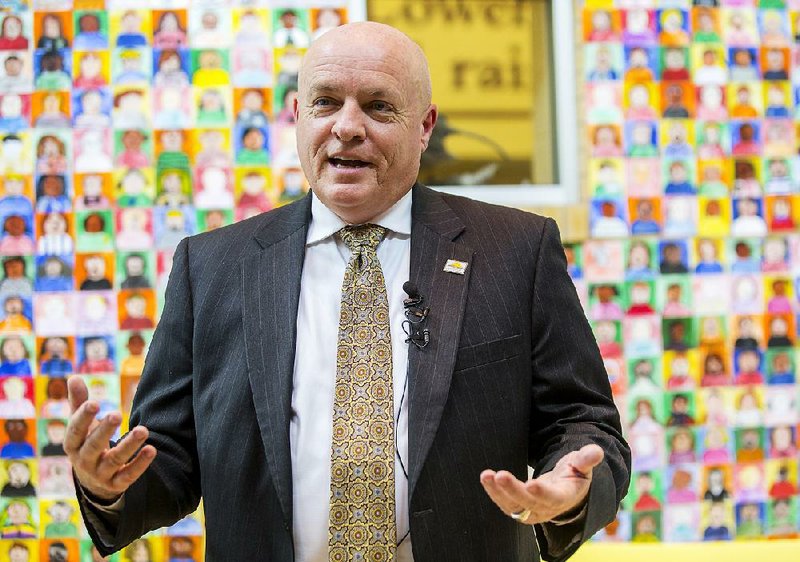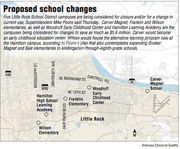Little Rock's Carver, Wilson and Franklin elementary schools, along with Woodruff Early Childhood Center and Hamilton Learning Academy, are being considered for closure or new uses, Superintendent Mike Poore said Thursday.
Closing the five schools or changing their use -- starting in the 2017-18 school year -- would save the district $5.6 million a year, Poore said in a series of meetings with principals, community members and the news media.
"The work on this is a starting point; this is a work in progress," Poore said of a package of budget-cutting options that includes repurposing and closing some schools. "This is not something today that defines exactly what for sure will happen."
The Little Rock district is the state's largest, with 22,759 kindergartners through 12th-graders this year, plus more than 1,000 pre-kindergarten pupils.
The savings from closing and repurposing schools would be almost half the $11.5 million in expenses the superintendent said must be cut next school year to complete a multiyear effort to offset the loss of $37.3 million a year in state desegregation aid. The district cut about $9.3 million in expenses for this school year and $18.2 million in 2015-16. Those savings were generated in part by reducing the number of workdays for employees and reducing health insurance contributions for employees.
This is the last school year that the district can use the special state desegregation aid for operating expenses under the terms of a 2014 settlement agreement regarding the federal school-desegregation case. The money is restricted to being used on district facilities in the 2017-18 school year, which will be the final year of the special funding.
Poore and his staff are proposing budget reductions in addition to changes at the five campuses to reach the $11.6 million goal.
The proposals -- all of which are subject to review and comment at upcoming public forums and approval from Arkansas Education Commissioner Johnny Key -- include about $2.8 million in cuts to school bus transportation costs, $4 million in cuts in school and central office staffing, $350,000 in cuts in lunch and bus-duty stipends to school staff members and $100,000 in cuts in legal expenditures. Key serves in place of a school board in the state-controlled district.
Other savings options have been identified for use as a "last resort" if the initial proposals fail, Poore said.
Those include reducing the district's $275-a-month contribution to employee health insurance premiums to $225 a month, contracting with outside agencies for custodial and food services and eliminating the $3,000 annual stipends paid to district teachers who earn national certification from the National Board of Professional Teaching Standards.
District leaders also are exploring the possibility of removing and selling 16 of the district's 54 portable classrooms, which would save utility costs, as well as generate some one-time revenue.
Also being considered is an early-retirement plan for employees, a plan that would provide financial incentives to longtime employees to leave the district and be replaced with less-experienced and lower-paid staff.
Cathy Koehler, president of the Little Rock Education Association employees union, said Thursday that she was "overjoyed" at some of the budgeting decisions -- including one to forego hiring outside companies to provide custodial and food services. Outsourcing the jobs would cause the district employees -- some of the lowest paid in the district -- to lose their health insurance and retirement benefits.
Koehler said she was also pleased that the district intends to continue making contributions to health insurance costs above the minimum required by the state and to continue stipends for nationally certified teachers.
She said her heart was breaking for those who might be directly affected by the closing of schools but she hoped that efforts to keep the buildings as part of their communities would be successful. She also said she didn't know how the district could survive "without closing something."
Jim Ross, who was on the Little Rock School Board when it was disbanded by the state in January 2015, led a group of community members last month in submitting alternative budget-cut proposals. Those include cutting districtwide curriculum facilitators, the student services office, consultant services, and the instructional staff training office.
He said the alternative cuts "were a saner place to begin."
"We were able to cut $11.5 million ... out of the budget with no teachers or support staff being fired, with no school closings, and with no loss of important resources to our kids," Ross wrote in an email. "We cut at the top, just like we promised when we ran for the board. We have no power; we have no voice, but we wanted you to see there is another way."
He predicted that area charter schools that are operated independently of the district would seek to acquire vacant school buildings from the district.
Poore had listed categories of potential budget cuts, including school closures, for the Arkansas Board of Education last month. On Thursday he identified the campuses being considered -- three for elementary schooling, one for preschool and one for alternative education.
In doing so, Poore said the district has 2,300 unfilled elementary school seats -- a number that doesn't include the use of available portable classroom buildings at campuses such as Dodd, Chicot, Fulbright, Otter Creek, Terry and Watson elementaries.
The budget proposal calls for Carver Math-Science Magnet, 2100 E. Sixth St., which has pre-kindergarten through fifth grades, to be converted into a pre-kindergarten center only. The school has 290 pupils, down from 474 pupils three years ago.
"I firmly believe we need to offer more preschool opportunities in the Little Rock area," Poore said. "You will find me, as your superintendent, fighting for that; I believe the commissioner of education values preschool education, as does our governor. I'm hoping we can find additional resources not only within our own budget but also within the state to help support us in advancing pre-kindergarten education."
Carver pupils likely would be reassigned to other special-program magnet schools in the district, such as Booker Arts Magnet Elementary or Gibbs International Studies-Foreign Language, or to Washington Elementary School, 2700 Main St. Poore said district leaders are considering expanding Booker Magnet Elementary, 2016 Barber St., into a performing-arts school for elementary and middle-school pupils, starting with the addition of sixth grade next school year.
The district is already operating the former Forest Heights Middle School for kindergarten through eighth grade.
"There are very few fine arts-type magnets anywhere in this region, and we think that can be a real attraction and draw," Poore said.
Franklin Elementary, 1701 S. Harrison St., near the University of Arkansas at Little Rock, has seen its enrollment drop from 443 in 2013-14 to fewer than 270 pupils this year. Poore suggested that Stephens Elementary, 3700 W. 18th St., could absorb the Franklin pupils while also welcoming Franklin's community partners, which include area churches and Arkansas Children's Hospital. The hospital operates a clinic at the school.
Wilson Elementary, 4015 Stannus Road, west of University Avenue and off Colonel Glenn Road, has 316 pupils who would be moved to Western Hills, Romine and Bale elementary schools.
Poore noted that elementary campuses with larger enrollments can lead to greater collaboration among teachers at each grade level, as well as improve resources such as a full-time counselor, nurse and assistant principal. He said he expects that the teachers at a closed school would be reassigned to other district schools and would not lose employment.
As part of the budget plan, the Wilson campus would house a component of the program now at Hamilton Learning Academy, 3301 S. Bryant St. The alternative program is for students in grades six through 12 who have not been successful at their traditional schools because of discipline or other problems.
The superintendent said the academy campus could be paired with its neighboring Bale Elementary School, 6501 W. 32nd St. to form a larger pre-kindergarten-through-eighth-grade complex.
Poore said the district doesn't want to lose the Hamilton name even if the academy is closed. Once Southwest Junior High, the school was renamed several years ago for the late W.D. "Bill" Hamilton, a longtime Little Rock School Board member.
Woodruff Early Childhood Center, 3010 W. Seventh St., is a small school and energy inefficient, Poore said. The district could close that campus and still increase the number of pre-kindergarten seats districtwide by making Carver a pre-kindergarten center, he said.
The district is considering the school closures and repurposing of buildings at a time when it is also planning for the construction of a new southwest Little Rock high school to replace McClellan and Fair high schools and complete the renovation of the former Leisure Arts warehouse into the Pinnacle View Middle School on Arkansas 10.
Poore said money for those and other building projects could be generated with a $160 million bond issue supported by the extension of already levied property-tax mills. The extended millage would have to be approved by voters, he said, probably at an election in the spring.
The district has scheduled seven public forums on the budget cuts, the first of which is from 6-8 p.m. Wednesday at the Dunbar Community Center.
A Section on 11/04/2016


